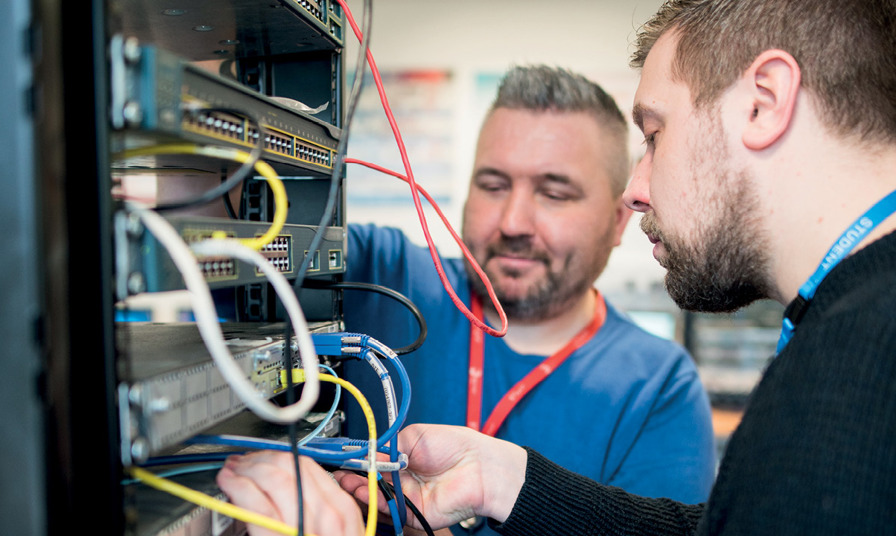Entry Requirements
You will need a minimum of 32 UCAS points that are from relevant fields or show an ability to study at a higher education level gained within the last five years.
Study Mode
Full time
Duration
Full time:
4 years
Timetable
Check with your tutor
Key Features & Benefits
- Validated by UK Top 15 Lancaster University
- Study in our dedicated University Centre
- Fit your studies around existing commitments
- Benefit from smaller class sizes
-
Overview
Our Networking and Cyber Security BSc (Hons) degree is designed to equip you with the ability to solve complex computing problems in order for you to progress to graduate-level roles.
This particular course is the Foundation Entry route which is ideal if you do not meet our standard entry criteria for the three-year Honours degree version of the course.
In your Foundation Year we will prepare you for future Higher Education study and introduce a broad range of Computer Science topics.
This degree examines the principles and threats which underpin computer systems, networks and the software development process. Throughout the course, you will become competent and confident in a range of prevalent topics, such as operating systems, network security, programming language, penetration testing, ethical hacking and more.
Our academics bring a wealth of expertise to the classroom with many continuing to undertake research and other projects alongside teaching, meaning our students gain a well-rounded and relevant teaching experience.
-
What will I study?
All students take a total of 120 credits per level.
Level 3 Modules includes:
- Study Skills for Computing
- Introduction to Web Development
- Introduction to Computer Systems
- Maths for Computing
- Introduction to Software Development
Level 4 Modules includes:
- Computer Systems Architecture
- Introductory Programming Concepts
- Computer Threats and Attacks
- Software Design and Development
- Network SystemsWeb Design and Development
Level 5 Modules includes:
- Network Infrastructure
- Cyber Security Analyst
- Modern Computing Environments
- Network Management
- Work Based Learning
- Research Project
Level 6 Modules includes:
- Distributed Computed Environments
- Cyber Security and Threat management
- Ethical and Legal Issues
- E-Business
- Major Project
-
Entry Requirements
UCAS points
You will need a minimum of 32 UCAS points that are from relevant fields or show an ability to study at a higher education level gained within the last five years.
Students who have not gained formal qualifications or have done so over five years ago will be invited to apply, and an interview will be used to determine your eligibility to study based on relevant life and work experience.
If English is not your first language you will need to demonstrate the ability to study in English. For non-native speakers of English, you must demonstrate proficiency of English equivalent to B2 of the Common European Framework, specifically IELTS 6.0 (or equivalent) with no more than 2 sub scores below IELTS 5.5 (or equivalent).
Applications from those without formal qualifications:
Applicants who do not meet the standard entry criteria but have relevant work/life experience will be considered on an individual basis and will be invited to interview.
The interview will consider prior formal qualifications, and evidence of experience gained through employment or other verifiable sources. S
Care Leavers or Young Carers
We want students from all backgrounds to have the opportunity to go to University. If you have spent three months or more in local authority care OR are a young carer, you will be eligible for a contextual offer. This is a grade reduction of 1-A Level grade below our standard entry requirements. For example, a standard offer of CCC, would become CCD. MMM at Level 3 Extended Diploma would become MMP. To apply we advise that you tick the box on your UCAS application which identifies you have spent time in care and to help identify you as eligible for our contextual offer.
-
How will I be assessed?
Assessment will be undertaken through a range of established methodologies at various stages throughout the course. Examples of assessment activity includes:
- Essays: that usually focus on analysing or evaluating theories, past research by other people, and ideas. They may include applying theory to practice.
- Seminars where you exchange results and findings centred around a particular topic.
- Examinations: that enable the accurate testing of the breadth of understanding of a given topic(s).
- Portfolios and ePortfolios: in which you will collate a body of work, evidence attempted labs - programming, security, networking and mathematical labs for instance.
- Reports: that present data and findings that you have collected yourself, for example through a survey, experiment or case study. Some reports focus on applying theory to your field of work and may discuss improvements and evaluation of the research or task undertaken.
- Presentations: that will allow you to present your findings, developments and research in a meaningful way to your peers and lecturers where you will have opportunity for meaningful feedback and discussion.
- Projects: such as research projects centred around a particular area of interest in Computer Science. Work Based projects undertaken in a work setting where you will apply a range of theories and practical skill. This culminates in the production of a Major Project at level 6 show casing all that you have learned during your studies.
- In class tests and practical tests: that will test your understanding and practical skills in subjects such as Networking, Structured Query Language (SQL) and Programming concepts.
- Group assessment: that allows you to build valuable employability skills working as part of a team. This could be centred around the development a project that meets a certain criteria or forming an incident response team. Not only could the maturity and completeness of the final product be assessed but also the how group functioned within the given time frame and setting.
-
Teaching and Learning
Learning and teaching will be delivered through a range of established methodologies including:
- Lectures
- Seminars
- Workshops
- Audio Visual materials
- Research
- Archive and Library searches
- Distance and e-learning (via VLE)
- Field Visits
- Attendance at conferences
- Presentations at conferences
- Research visits
-
What can I do next?
Graduates of the programme can progress onto a diverse range of professions with an Honours degree in Computing. These include: Software Developers, Business Analysts, Web Developers, Project Managers, Network Designers, Teachers and Games Developers, will be accessible at a more senior level in addition to professions requiring knowledge of more specialist areas such as Data Science, Distributed Computing, Security and Mobile Development.
Upon successful completion of the course, you could choose to progress onto Masters programmes. Opportunities include MSc programmes in Databases Design, Computer Science, Internet Technologies and Agile Software Projects.
-
Supplementary Information
Work Placements
Work placements are subject to availability. You are also responsible for any costs in travelling to and from your work placements, for any accommodation costs and in some instances the cost of acquiring a satisfactory Disclosure and Barring Service (DBS) report.
-
Fees and Finance

95.8%
Highest in the area for students feeling supported by teaching staff in their learning.















